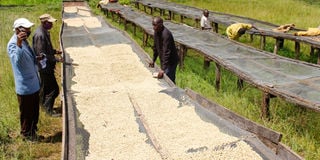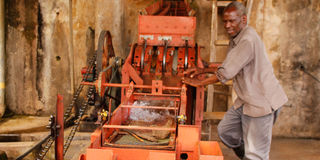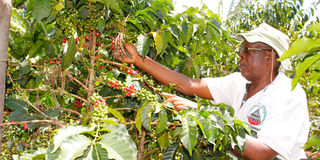Premium
Dwindling fortunes for Meru coffee farmers as assets are 'looted'

Workers prepare coffee berries at Amung'enti Coffee Factory in Igembe South, Meru County.
If you are looking for evidence that the coffee sector in Meru is on its knees, take a tour of the hundreds of berry pulping factories strewn across the county.
The investments are rotting away in neglect, even as some of the premises have been encroached on, or worse, plots excised and sold to private developers.
Farmers and factory workers relive the “good old times” when they educated their children and built homes using proceeds from the cash crop.
However, despite the collapse of the sector, some individuals have continued to benefit from the assets that farmers built with their sweat, even as coffee growers lament over dwindling fortunes.
Coffee unions in Meru own assets worth billions of shillings but farmers have not received a penny in dividends over the past two decades.

Makiri Coffee Factory Manager John Ntarangwi operates the factory's aging pulping machine.
Millions from key investments
Two key investments – Imenti House and Nyambene House – owned by Meru Central Coffee Union (MCCU) and Meru North Cooperative Union (MNCU) respectively, are located in Nairobi and rake in millions of shillings in rent each month, yet farmers have not benefited from the investments.
The unions own several other investments in Meru County, including commercial and residential buildings and godowns.
Instead of passing the benefits of these investments to farmers, officials are milking the little left, even as the sector is on the verge of ruin. The coffee merchants are literally dancing on the grave of the collapsed industry.
Web of deceit
Investigations by the Nation have revealed a web of deceit by the officials who have been accused of benefiting from the proceeds for years.
At the centre of the accusations of this plunder are coffee society management committees that have been accused of colluding with corrupt cooperatives officers at the county and national levels.
The earnings from investments do not reflect the picture on the ground.
For instance, a visit to the multi-million-shilling Meru North Cooperative Union’s office in Maua town reveals a deserted building – tracks to the building have since run cold.
The union’s office sits by the road, fenced off and overlooking Makiri Coffee Factory that stands out for its dilapidated structures in the thriving Maua town. The coffee factory’s iron sheet buildings have turned rusty brown.

Meru Coffee Millers Co-operative Union Chairman Zablon Mbaabu at his coffee farm in Kathera.
Private school
An occasional aged pole marks where extensive drying beds stood in the good old days when coffee was the region’s economic mainstay. On one section of the factory compound is a private school that has leased the land.
A lone worker prepares some coffee beans at the factory’s aging pulping machine. Some beans are spread out on the only surviving drying bed near the pulping machine.
''Were it not for the rent we get from the private school, we would not be able to keep the pulping machine running,” Mr John Ntarangwi, the factory manager, says.
He has worked at Makiri Coffee Factory since 1975, living through the rise and fall of coffee farming.
“By 1996, the cooperatives and the union had collapsed and our society was liquidated. However, the liquidation process was never completed. I was requested to remain behind to look after the factory,” he recounts.
This is the tale of coffee societies in Tigania West, Tigania East, Igembe South, Igembe Central and Igembe North that formed the giant Meru North Cooperative Union.
The irony of this picture is that Meru North Cooperative Union owns Nyambene House in Nairobi, four acres of land in Ruaraka (which is now disputed after a controversial sale), about four acres of land in Meru town and a godown in Nanyuki and Meru.
The disputed Ruaraka land is valued at Sh1.1 billion and is the subject of a court case in Nairobi.
Sh1.5m monthly rent
Today, Meru North Cooperative Union earns more than Sh1.5 million in monthly rent from Nyambene House and over Sh200,000 from other properties in Meru.
The bone of contention has been who has been pocketing the close to Sh2 million every month for the last 22 years when the coffee industry in Meru North collapsed.
“The Meru North Cooperative Union is like a parasite. The union does not offer any services to the societies and farmers yet we know it gets over a million in rent every month.
“In the past, the union used to subsidise inputs for farmers, repair factory machinery and provide book-keeping services. Today, we don’t know where the money goes because there are no such services,” a coffee factory worker in Igembe South laments.
The union’s affairs have also attracted a group of Njuri Ncheke elders living in Nairobi who called in the Directorate of Criminal Investigations (DCI) to probe the management of the union’s finances.
“The property owned by the union was bought with money contributed by our parents in the 1960s and 1970s. We suspect the income earned by the union is going into individuals’ pockets. The same people have been in the management for decades. This is why we called for investigations,” Mr Mwenda Thiribi, one of those who wrote the petition, says.
Stopped offering services
Mr Erastus Linguli, a former Meru North Cooperative Union official, says the union stopped offering various services to societies as long ago as 1995.
In a complaint letter written to the Ministry of Cooperatives in March 2004, a section of coffee farmers called for an inquiry, citing mismanagement of the union’s resources.
“The union has paid heavily for non-existent services rendered including salaries and allowances to non-performing persons from 1997. The woes of the union started when the managers and management committee selfishly decided to go it alone – closed all stores and distanced the institution from the societies who are the owners and members of the union,” the letter reads.
Mr Linguli says the union’s management committee has been operating as a secret organisation for more than 20 years.
“The questions coffee farmers want answered are how much money is flowing into the union and how it is spent. The union should be using the income to provide technical and training services to surviving coffee societies,” he says.
A coffee union is expected to provide various services including book keeping, promotion of coffee farming, training on good agricultural practices, value addition and input subsidies among others.
But Mr Josephat Thiaine, the union’s chairman, argues that not a single shilling has been misappropriated since he took over in 2006.
Sh500,000 monthly salaries
Despite not offering any services to coffee farmers, the union still pays salaries of more than Sh500,000 every month, according to him.
He says that when he joined the management committee, the union was indebted to banks, Kenya Revenue Authority, Kenya Railways, county council and former employees to the tune of over Sh85 million.
“In 2006, I found a union that was on its death bed. The Nyambene House lease had expired in 1994 and the union was about to lose it. The building had been condemned and rent was about Sh350,000. We had to renovate it extensively to raise the income to Sh1.4 million currently.”
“We have paid Sh2.7 million in pending land rates, Sh8 million to KRA, Sh670,000 to Kenya Railways for Nanyuki godown and cleared most of the pending employee benefits. Our biggest financial burden now is the Ruaraka land case but we have reduced our debts to about Sh10 million,” Mr Thiaine said during an interview.






